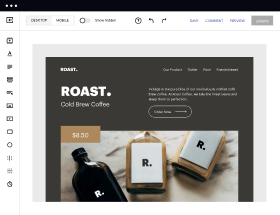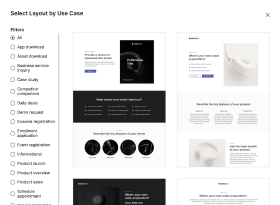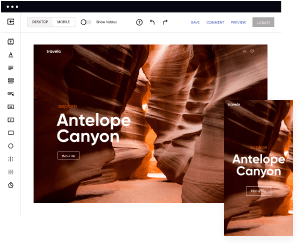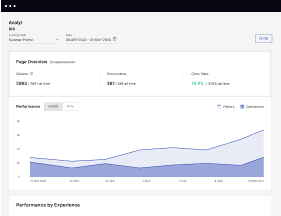Microsite template for WordPress developers
Create customized landing pages quickly with Instapage's Microsite template for WordPress developers. Build high-converting pages with 500+ layouts and Instablocks, optimize for conversions, personalize content, and collaborate efficiently.

Easy to build without coding
With the intuitive drag-and-drop builder, anyone on your team can create high-converting pages without any knowledge of code or design. Make enhancements to your landing page with custom widgets using Javascript, HTML/CSS, or third-party scripts.
Multiple layouts for any industry and goal
Select from 500+ landing page layouts built to boost conversions across industry-specific scenarios. Customize them by adjusting fonts, adding images, and generating on-brand content with the AI assistant. Quickly scale with Instablocks® and Global Blocks that you can save, reuse, and update globally.
Loads fast and looks polished on any device
Every template is responsive, which means they present professionally on any device and load blazingly fast with our Thor Render Engine. You can also power them up with Google AMP technology to deliver an unparalleled mobile experience and drive higher conversions.
Robust analytics & experimentation
Get real-time updates and reporting across all your devices, showing the number of visitors, conversions, cost-per-visitor, and cost-per-lead. Launch AI-powered experiments, run A/B tests, and use heatmaps to analyze user behavior, then optimize your landing page to maximize conversions.
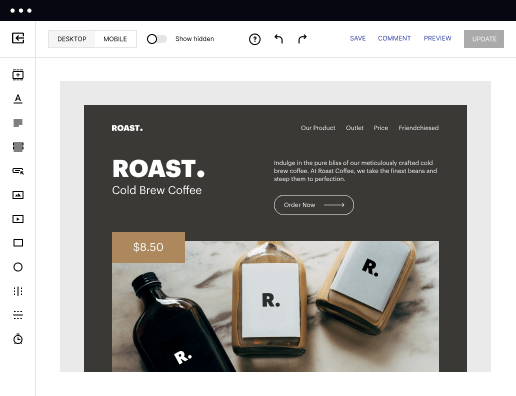
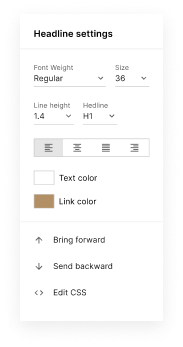
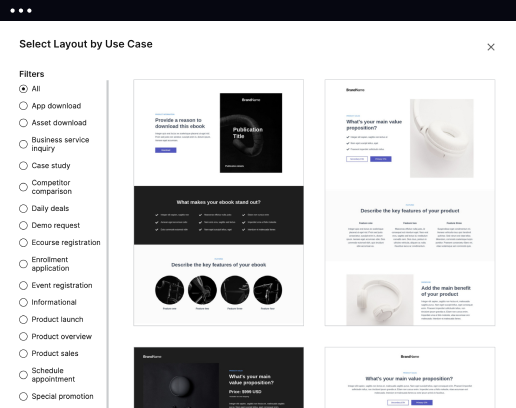
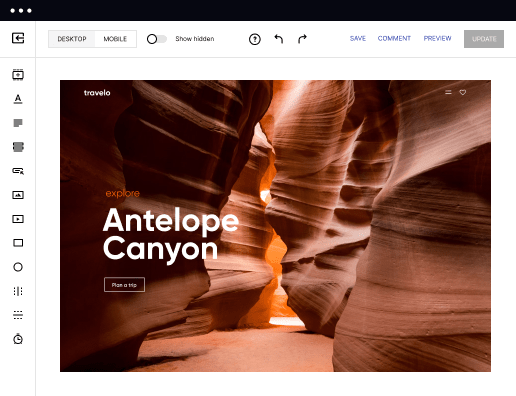
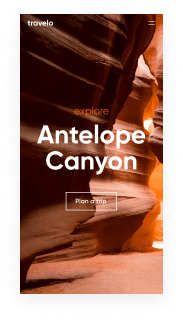
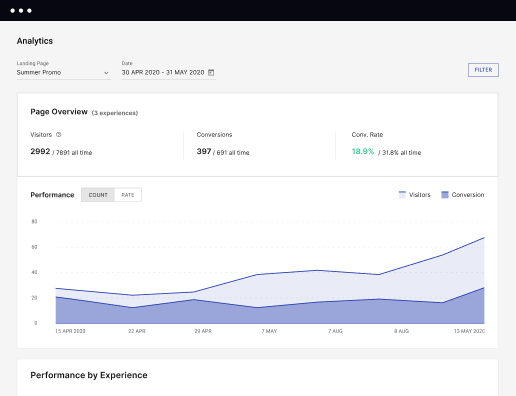
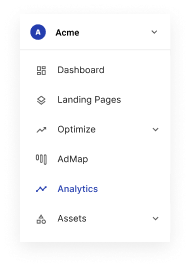
Easy to build without coding
With the intuitive drag-and-drop builder, anyone on your team can create high-converting pages without any knowledge of code or design. Make enhancements to your landing page with custom widgets using Javascript, HTML/CSS, or third-party scripts.
Multiple layouts for any industry and goal
Select from 500+ landing page layouts built to boost conversions across industry-specific scenarios. Customize them by adjusting fonts, adding images, and generating on-brand content with the AI assistant. Quickly scale with Instablocks® and Global Blocks that you can save, reuse, and update globally.
Loads fast and looks polished on any device
Every template is responsive, which means they present professionally on any device and load blazingly fast with our Thor Render Engine. You can also power them up with Google AMP technology to deliver an unparalleled mobile experience and drive higher conversions.
Robust analytics & experimentation
Get real-time updates and reporting across all your devices, showing the number of visitors, conversions, cost-per-visitor, and cost-per-lead. Launch AI-powered experiments, run A/B tests, and use heatmaps to analyze user behavior, then optimize your landing page to maximize conversions.
All the features you need to build lead-generating landing pages
Explore more featuresLearn how to build top-performing landing pages for any goal
FAQs
Leading the way in building high-performing landing pages





Maximize your ROI with Instapage: The ultimate landing page and CRO platform
Creating effective landing pages is critical for any marketing strategy. Instapage accelerates your campaigns by providing powerful tools for conversion rate optimization (CRO). With ready-to-use templates and a collaborative platform, marketing teams in sectors like Tech/SaaS, Education, and Financial Services can optimize their digital presence with ease.
Getting started with Instapage
Before you launch your campaigns, understanding the core features of Instapage is vital. From flexible page creation to advanced optimization tools, Instapage will enhance your marketing efforts effectively. Dive into the following steps to create high-converting landing pages that boost engagement and enhance returns on investment.
- Utilize pre-built templates and elements: Choose from over 100 high-converting templates tailored for various verticals, making it easy to design a landing page without starting from scratch.
- Implement dynamic content delivery: Personalize your messaging by dynamically replacing text based on user behavior and demographics, ensuring each visitor receives a tailored experience.
- Leverage analytics tools for insights: Regularly review performance metrics with detailed heatmaps and A/B testing to iterate and continuously improve your page effectiveness.
Step 1: Design your landing page
Designing your landing page with Instapage is straightforward. Begin by selecting a template that aligns with your campaign goals.
- Drag and drop builder: Use the intuitive builder to drag and drop elements into your page layout, ensuring it meets your brand’s requirements.
- Customizable layouts: Adjust colors, fonts, and images to align with your branding, making your page visually appealing.
- Include strong call-to-action (CTA): Place CTAs strategically on the page to guide users toward desired actions, ensuring higher conversions.
Step 2: Optimize for conversions
Once your design is ready, it’s time to optimize it for better conversions. Instapage’s built-in tools allow for experimentation and detailed insights.
- Team feedback mechanisms: Instantly share your pages with stakeholders for immediate feedback, ensuring everyone is aligned prior to launch.
- Real-time editing: Collaborators can conduct edits simultaneously, allowing for rapid adjustments that keep the project moving forward.
- Sharing capabilities: Distribute your landing page to external partners or clients securely to gather their input before the final launch.
Step 3: Collaborate and launch your campaign
Bringing your team into the workflow can enhance the page creation process. Instapage’s collaboration features simplify this by allowing real-time feedback and edits.
Effective landing page creation is an ongoing process that involves continuous optimization and collaboration. By taking advantage of Instapage’s powerful features, your marketing campaigns will truly stand out.
Ready to transform your approach to landing pages? Dive into Instapage today and unlock the potential of your digital marketing campaigns!
The future of landing pages: Unleashing the potential of microsite templates for WordPress developers
Understanding microsite templates in WordPress
Microsite templates have emerged as a specialized tool within WordPress development, tailored to optimize specific campaigns or initiatives. A microsite template is a compact, focused website that serves a singular purpose, often distinct from the main website. These templates streamline content presentation, ensuring that users are guided directly to relevant information, thus enhancing their overall experience. The role of microsite templates in modern web design is significant; they cater to businesses that require flexibility without the complexity of full-on website development.
In contrast to traditional templates, which accommodate a broad array of content and functionalities, microsite templates hone in on specific goals. They may house fewer pages, often concentrating on landing pages, promotional content, or event-specific material. This directed focus can significantly bolster user engagement and conversion rates. Developers can leverage microsite templates when launching new products, hosting events, or creating promotional campaigns, allowing for quick deployments with high impact.
The value proposition of microsite templates
One of the most compelling aspects of microsite templates is the enhanced user experience they provide. Designed for streamlined navigation, these templates direct visitors toward action without unnecessary distractions. By organizing information efficiently, microsites cater to specific user needs and interests, resulting in a more engaging experience. This kind of tailored delivery is particularly useful for niche audiences where typical website navigation might overwhelm or confuse potential customers.
Moreover, microsites typically see increased conversion rates compared to their more comprehensive counterparts. According to studies, microsites can boost conversions by as much as 30-50% by creating a focused marketing environment. Numerous case studies illustrate this trend: for example, a tech company promoting a new software product experienced a 40% increase in demo sign-ups through a dedicated microsite. These success stories serve as compelling indicators of the power of microsite templates in driving effective marketing strategies.
Customization options: Tailoring the microsite experience
Customization is key to maximizing the effectiveness of microsite templates. With various design styles available, developers have the flexibility to ensure their microsite aligns with brand identity. Maintaining branding consistency across microsites not only reinforces brand recognition but also enhances consumer trust. All visual elements, from color schemes to typography, should reflect the core brand ethos while being tailored to the specific goals of the microsite.
Functional elements are equally vital. Features such as clear call-to-action buttons, intuitive forms, and multimedia integration can enhance user interaction. For instance, including video content or testimonials can amplify trust and convey complex messages succinctly. Additionally, considering off-canvas filters can improve navigation, allowing users to explore different facets of the microsite without overwhelming them with information.
Furthermore, A/B testing capabilities within these templates allow developers to experiment with various designs, content placements, and calls to action. By setting up different versions of a page, developers can gather valuable data about user preferences and behaviors, which can lead to improved engagement and conversion rates.
Optimizing your microsite: Features that matter
For microsites to be effective in today's mobile-centric landscape, responsive design is essential. A mobile-first approach ensures that content is accessible and visually appealing across all devices, eliminating the frustration that often arises from poorly formatted pages. Best practices include testing designs on multiple screen sizes and ensuring that touch interactions are smooth and intuitive.
Beyond design, SEO considerations are paramount for microsites. Strategies such as optimizing page titles, meta descriptions, and structured data can enhance discoverability. Micro-content should be well-structured, featuring relevant keywords that align with user search queries. Developing a strong content strategy not only supports SEO but also consolidates the site’s messaging to increase engagement and retention.
Integrating analytics and tracking tools into a microsite is crucial for understanding visitor behavior. Essential tools like Google Analytics or conversion tracking solutions help monitor key performance indicators such as traffic sources, user engagement, and conversion rates. Interpreting this data enables developers to make informed decisions about future updates and enhancements, ensuring the microsite remains relevant and effective.
Best practices for developing effective microsites
Understanding your audience is the first step toward creating a successful microsite. Techniques such as conducting surveys and analyzing visitor data provide insights into user demographics and preferences. Tailoring content and design to meet the expectations of your specific audience can dramatically increase user engagement and drive conversions.
An iterative design process is also vital. Feedback loops between development and user experience ensure that the microsite evolves to meet user needs effectively. Incorporating user testing and surveys into the design cycle can yield insights that enhance usability and satisfaction.
Strategic content planning is critical for guiding users through the microsite. Crafting compelling narratives ensures that visitors understand the value proposition clearly. The messaging should be concise and actionable, leaving no ambiguity about what the user should do next, be it signing up, downloading, or making a purchase.
Tools and resources for WordPress developers
Numerous plugins can enhance microsite development in WordPress, streamlining various processes. Essential plugins may include Elementor for drag-and-drop design, Yoast SEO for content optimization, and gravity forms for user-friendly data collection. Each of these tools aids in building a robust microsite that meets both aesthetic and functional goals.
Inspiration is key when designing microsites. Websites like Awwwards or Behance showcase innovative designs and cutting-edge ideas that developers can draw upon. Exploring these resources not only stimulates creativity but can also provide practical examples of effective layout and design strategies.
Engaging with the developer community is another critical resource for WordPress developers. Forums and groups on platforms such as Stack Overflow or dedicated Facebook groups offer a platform to exchange ideas, seek mentorship, and share experiences. This collaborative environment can significantly contribute to professional development and project success.
The future of microsite development in a changing landscape
Microsite development is on the cusp of significant evolution, with emerging trends and innovations shaping its future. Technologies such as artificial intelligence and machine learning are increasingly being integrated into web design, enabling personalized content delivery like never before. Moreover, the emphasis on user data will continue to drive the development of templates that cater specifically to individual user needs and preferences.
In addition, bridging microsites with broader web strategies will become more crucial. As marketing campaigns grow more complex, integrating microsites into larger campaigns can amplify their effectiveness. Developers must consider how these focused sites complement traditional, comprehensive websites, ensuring a cohesive online presence that enhances brand engagement.
Real-life applications: Showcasing successful microsite examples
Different industries leverage microsites in diverse ways. For instance, in e-commerce, brands use microsites to launch new product lines, creating a dedicated space to highlight features and drive conversions. Nonprofits may develop microsites for specific campaigns, providing information and facilitating donations in a focused manner. Event promotion microsites allow for streamlined information sharing, ticket sales, and even virtual event participation.
Insights from users and developers also provide useful perspectives on microsite effectiveness. Many developers report increased satisfaction in project outcomes when utilizing focused templates. Testimonials reflect how businesses have achieved significant milestones, whether through improved conversion rates, enhanced engagement, or increased brand visibility. These insights highlight the real-world value of investing in quality microsite development.
Conclusion: Harnessing the power of microsites in WordPress development
Microsite templates represent a transformative opportunity for WordPress developers looking to enhance user engagement and improve conversion rates. By creating specialized, focused landing pages, businesses can meet specific marketing objectives while providing a streamlined user experience. Developers are encouraged to explore the innovative microsite solutions that can elevate their projects, ensuring they stay relevant in an ever-evolving digital landscape. Embracing these templates can lead to newfound efficiencies and impactful results for websites of all types.
Ready to skyrocket conversions?
Supercharge your ad campaigns with high-performing landing pages
Get started



